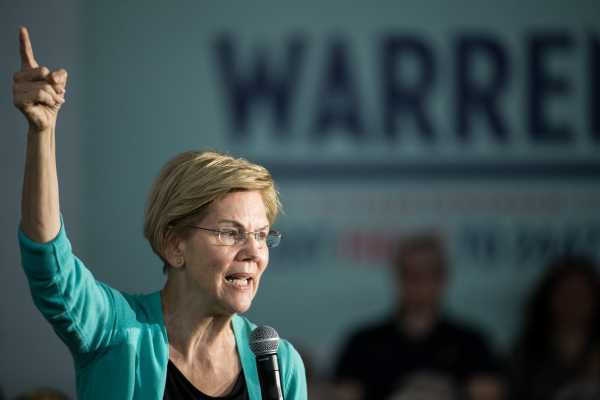
This story is part of a group of stories called

Uncovering and explaining how our digital world is changing — and changing us.
For the past few years, there has been a loud and contentious debate about the need to reform and regulate Silicon Valley. But it hasn’t come up during the three Democratic presidential debates this year: Except for a quick aside about American workers’ jobs, the subject of technology has been almost entirely absent from debate stages.
There’s a decent chance that changes Tuesday night.
That’s because Sen. Elizabeth Warren, who has been a consistent critic of big consumer tech companies for months but hasn’t made them a focus of her campaign, has spent the last couple of weeks going directly at Facebook.
And if she’s not ready to start talking about her plans to reform and/or break up the big tech companies in Westerville, Ohio, on Tuesday, then maybe we should conclude that none of the Democrats running for president think American voters really care about this stuff. Republicans already seem to think it works for them: Donald Trump loves using Twitter and his campaign spends heavily on Facebook, but he and his party spend a lot of time complaining that Big Tech is out to get them.
To recap: Warren has criticized Facebook, along with Amazon and Google, on antitrust grounds for years. But she hasn’t spent much time focused on the tech companies during her campaign this year.
Things changed on October 1, when the Verge published comments from an internal Facebook meeting during which CEO Mark Zuckerberg said it would “suck for us” if Warren was elected and pursued an antitrust case against the company, describing it as an “existential” problem. Since then Warren has aimed directly at Facebook — often using Twitter to do so:
Warren has ratcheted up her attacks since then. A week ago and without offering evidence, she accused Zuckerberg of making a backroom deal with Donald Trump that led to a Facebook decision to let politicians run misleading ads on the platform. Then her campaign tried to illustrate her charge by running a (sort-of) deliberately misleading ad on Facebook, then tweeting about Facebook’s approval:
Facebook, for its part, has argued that TV broadcasters don’t ban misleading ads from politicians. “We agree it’s better to let voters — not companies — decide,” the company’s public relations reps wrote in an unsigned tweet Saturday night:
The debate about Facebook’s responsibility when it comes to paid political speech — and whether Facebook thinks it should be regulated by the same rules the Federal Communications Commission uses to oversee broadcast TV stations — could be a nuanced and interesting one if it comes up Tuesday.
But the hunch here is that Warren doesn’t want to spend a lot of her time talking about FCC election regulations. I’m guessing that what she really wants to do is use Facebook as a proxy for what she thinks is a general distaste voters have for giant tech companies — especially companies voters may already blame for helping to elect Trump in 2016.
You could also argue that Warren has been laying into Facebook in the run-up to Tuesday’s debate simply because of the news cycle — if the Verge had surfaced those comments about her six months ago, she would have jumped on them back then. Ditto for Facebook’s decision to allow misleading ads like the one the Trump campaign has aimed at Joe Biden.
And Warren’s plan to break up Facebook and other big tech companies is, indeed, one of her many, many plans. (Here we should point out that Warren, like all of the Democratic candidates, spends a lot on Facebook ads — but nothing close to what Trump is spending).
But if Warren thinks her anti-Facebook campaign has real traction — and that the techlash isn’t simply something that only concerns tech workers in Silicon Valley, politicians in Washington, and the national media — then this is the time to test that theory.
And if she does, then Zuckerberg and his fellow moguls may really have to start worrying. Republicans from Donald Trump on down have been happy to bash tech companies for the past year, primarily over charges (without real evidence) that tech companies are censoring conservatives. If Warren and/or her fellow Democrats are willing to join in, it may not matter that both sides are mad at tech for different reasons. Big Tech would still be in for a very long fight.
Sourse: vox.com



